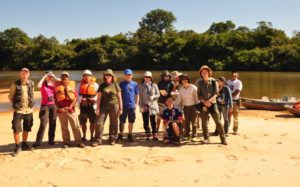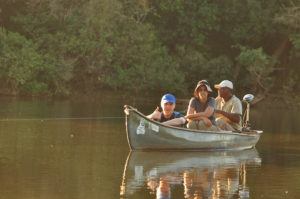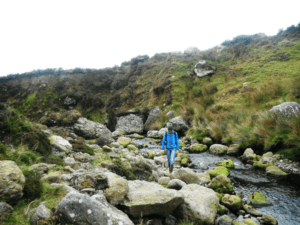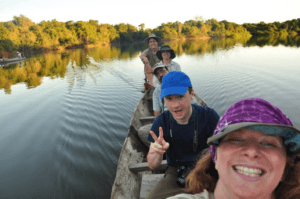Profile
David
My CV
-
Education:
De La Salle College Waterford, and Waterford Institute of Technology
-
Qualifications:
I have a Higher Certificate in Science, a Bachelors in Biotechnology, an Honours Bachelors in Applied Biology and Quality Management, and a PhD in molecular biology
-
Work History:
I've worked in Waterford IT as a postdoctoral scientist and project manager, and I worked in Dublin as an Applications Specialist in molecular biology
-
Current Job:
I'm currently an Assistant Lecturer in Microbiology and Biopharmaceutical Science, and I am a researcher in WIT's Eco-Innovation Research Centre.
-
About Me
Lecturer and Researcher in molecular biology
-
Read more
I live by the phrase “You’re in charge of your own two feet”. They will take you where you want to go. Find your goal, you work for it on a daily basis, and go achieve.
-
Read more
My first taste of research was during my third year in college, and I looked at different bacteria that could make proteins that could speed-up chemical reactions. This was part of my first degree, and I continued my work during that summer thanks to an internship that I was awarded.
After that, I definitely knew that I wanted a career in research. I found it all very exciting, and I loved that I was doing brand new work that nobody had done before.
I took on a different type of project for my next degree, so I could try a new research area. I looked at the risk of antibiotic resistance building up in the meat of animals over time if they were eating silage and other feeds contaminated with the fungi that produced crude antibiotic.
Before I finished my final degree, I was fortunate to be awarded a prestigious PhD scholarship from the Irish Research Council for Science, Engineering and Technology back in April 2007.
My PhD wasn’t going to start until later in the year, so I had the whole summer free. What was I going to do?? Fortunately, my lecturers offered me a research position, to investigate wildlife. In Canada. In very very remote Canada. I could’t say no. I finished a series of teacher’s diploma exams in Dublin, hopped on a plane, and found myself in the depths of the forests of Newfoundland. I spent over three months there surveying for marten, which are protected by law, with an aim of studying their DNA to help us understand their distribution and population size.
I eventually returned home, and started my PhD studies in October 2007. My PhD was on seaweed and their ability to trap toxic metals from water. I was looking at genes within the DNA of seaweed that could make proteins that could trap the metal. Seaweed was relatively understudied in this respect, and I managed to find and characterise a brand new metal-binding protein. I’ll return to this topic of work a little later.
I finished my lab work in December 2010, and I jumped at the opportunity to join a team that studied wildlife. I started working as a postdoctoral scientist, and I designed new DNA tests to study a range of animals in Ireland and the UK. I did that job for about two years, and then became a Project Manager for a large wildlife conservation project, which I did for another two years.
After that time spent in research, I wanted a new challenge. I had worked on the DNA of bacteria, plants, algae, and wildlife…. but I never worked on human genetics. So, in 2015, I was lucky to be appointed to an incredibly exciting job in Dublin, working as a Field Applications Specialist. I was a specialist in state-of-the-art molecular biology techniques (mainly based on DNA), for applications like clinical diagnostics that aimed to help improve the health of humans and animals, and it was in the “field”, as in, I was out there going around to lots of different labs in hospitals and universities, and helping scientists with their questions and challenges. I really loved the job, and I got to meet incredible people doing some amazing work here in Ireland. I was a member of a multi-award winning team for Europe, Middle East and Africa.
I had to make the tough decision to leave that job, and move back home, down to South Kilkenny. It’s here that I wanted to live, there was a research team in Waterford that I wanted to work with and build up our research again, and it’s where I also teach Irish dancing.
I’m lucky that I have the beautiful blend of lecturing, science, research, and dancing.
The subjects I teach include: Cell Factories and Mammalian Cell Culturing; DNA Technologies and Bioinformatics; Food Microbiology for Culinary Arts; Food Traceability and Genomics; Applied Enzymology and Biochemistry; Animal Breeding and Genetics; Biopharmaceutical Science; Environmental Science; Plant Biology; Food Microbiology; Bioanalytical Methods for the Food Industry; Introductory Biology; Good Lab Practice; Cell Biology and Biochemistry.
My research at the moment is split in two. My field of expertise is molecular biology and genetics, and my current research is in the area of ecosystem protection and health. I use my expertise to reveal the stories that the DNA from various organisms can tell, and I use that ability to help address and make impact on the global challenges of water quality and wildlife conservation:
- I look to understand how gene-encoded proteins of plants and algae can trap toxic heavy metals from polluted waters, and how we may harness the power of these natural systems to provide clean and safe water. I’m looking at challenges in Ireland as well as in developing countries.
- I also use non-invasive genetic testing to study rare and protected animals, and provide authorities with high-resolution biodiversity data to help deliver successful conservation plans and implementation of effective mitigation measures in response to pressures of climate change.
-
My Typical Day
Coffee. Science. Dance.
-
Read more
I’m usually in my office before 8 every morning, coffee in hand. I’ll send a few emails, or will read a new scientific paper.
By 9:15, I’m either on my way to my first lecture, or to the lab. I lecture on lots of subjects including microbiology, biochemistry, and advanced DNA technology. I lecture on the Biology programme, and the Agricultural Science programmes.
The students at WIT cover the course work 50:50 between labs and lectures. That means we spend half our time in a lecture room learning the theory, and then we get to go to the labs to run the experiments. It’s a really great learning experience.
During the day, I’ll also do some of my own research experiments too, or will work on a funding application to further my research.
I usually finish work around 5, and then I go teach Irish dancing every other evening to kids aged 3-18. I’m lucky to be able to balance two very different careers that I love.
-
What I'd do with the prize money
Science outreach with secondary school students.
-
My Interview
-
How would you describe yourself in 3 words?
Determined. Hardworking. Ambitious.
What did you want to be after you left school?
I wanted to go on tour with Riverdance.
Were you ever in trouble at school?
I wouldn't say "trouble", but I often found myself outside the door of Biology class. But we won't talk about that.
Who is your favourite singer or band?
The Killers.
What's your favourite food?
All.
What is the most fun thing you've done?
Living in field stations in very remote parts of Canada and Brazil when I was doing research on wildlife.
If you had 3 wishes for yourself what would they be? - be honest!
To always love the job I do. To be able to make a positive difference in the lives of as many people I can. To have more time with my dog Theo.
-
-
Work photos:








